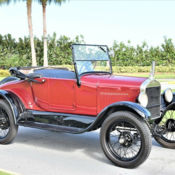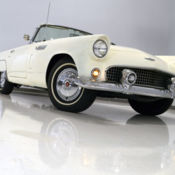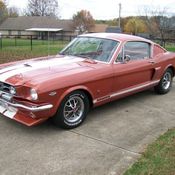Rare early T Runabout. Older restoration. Recently serviced. Ready to enjoy!
1910 Ford Model T for sale in Macedonia, Ohio, United States
| Item location: | Macedonia, Ohio, United States |
| Make: | Ford |
| Model: | Model T |
| SubModel: | Runabout |
| Type: | Convertible |
| Year: | 1910 |
| Mileage: | 2,225 |
| VIN: | 19879 |
| Color: | Black |
| Number of cylinders: | 4 |
| Fuel: | Gasoline |
| Transmission: | Manual |
| Interior color: | Black |
| Vehicle Title: | Clear |
| Want to buy? | Contact seller! |
Description for Ford Model T 1910
Model Ts are a special part of the American landscape. They were obviously quite popular when they were new, offering mobility to the American people that was virtually unknown before their arrival. They were some of the first cars to be treated as collectables, often showing up as special-use-only machines as early as the 1930s. And today, people around the world still recognize Henry Ford’s Tin Lizzie and it still resonates as an integral part of modern automotive lore.
But did you realize that not all Model Ts are created equal? The remarkable part of the Model T story is the implementation of the assembly line, which happened in 1912 or 1913, depending on who you ask. Prior to that, Model Ts were hand-assembled just like every other car, and while they were still rugged, simple, and affordable machines, they were very different animals than their mass-produced siblings. As a result, these early “pre assembly line” cars are highly sought and extremely desirable machines in their own right, and the contrasts with the later cars are fascinating.
This particular 1910 Model T Runabout comes from long-term ownership in a single family dating back decades. It’s one of those fantastic older restorations that was done in the 1950s when Model T enthusiasm was arguably at its peak and the cars were not only plentiful, but also properly restored and maintained. Showing serial number 19879, it dates to early April 1910, making it a remarkable survivor that is quite faithful to the original intent, skipping the various “upgrades” that many Model T owners would inflict on later cars. The wooden Runabout body is original and in fantastic condition, wearing correct black varnish with ornate gold pinstripes that make the simple T look far more elegant and sophisticated. The simple fenders, wooden firewall, and upright windshield are all part of the Model T’s charm and on this car they remain in excellent condition. The brass has a soft shine that could be enhanced with some elbow grease or left as-is for a bit of patina that suits the car just fine. The original head lights are intact (although the carbide generator is gone), as are the kerosene-fired cowl lamps and taillight. Various Ford script emblems have been added over the years, a feature I think Henry Ford would appreciate, as well as ‘1910’ numerals front and rear, something that isn’t authentic but will certainly cut down on the number of questions you have to answer at fuel stops. The paint, which is now the better part of five decades old, remains in great condition and the car needs nothing to be shown and enjoyed as it sits.
The black leather upholstery is also quite correct, using diamond-tufted patterns on the surprisingly comfortable front seat as well as the smaller “mother in law” seat in back, which is probably best suited to people you don’t like. The wooden firewall is neatly varnished with a soft glow and the original coil box (full of irreplaceable early coils) is in fantastic condition. Note the brash fittings throughout, including the ignition switch assembly and the spark and throttle levers on the steering column. The thick wooden steering wheel seems surprisingly robust for the delicate-looking T, but it feels great in your hands. You’ll note this car carries an accessory Jones speedometer that works properly today. It shows 2225 miles, but we have no way of authenticating that figure. We suspect that the speedometer was installed during the time of its restoration in the 1950s (note the phillips-head screws, which weren’t invented until 1937), and if that’s the case, we’re more than willing to believe the mileage is since that time. Regardless of the figure, it’s clear that this Model T, like most others, has been reserved for short drives near home, not cross-country treks. The car is set up for a convertible top, but there is no top included (two irons are included and complete tops are readily available).
Early Ts were unique in the mechanical department as well. Yes, it’s the same durable 177 cubic inch inline-4 that powered all the Model Ts, but the earliest cars like this used exposed valve trains, which not only provides a fascinating window into the engine’s operation, but makes genuine early cars easy to spot. We’re assuming that the engine has been rebuilt at some point and it has been recently and extensively serviced so that it runs its very best today. Get the spark and throttle settings right and it fires with a single pull of the crank, a rather remarkable feat that’s always a crowd-pleaser. The engine bay is neatly detailed with new cloth-covered spark plug wires, correct hose clamps, a leather fan belt, and a freshly rebuilt carburetor. There is no water pump, as all early Ts used a thermosiphon system to circulate coolant, and this one shows no propensity to run hot thanks to a new radiator core in the brass shell.
The transmission is also the familiar 2-speed planetary setup used throughout Model T production, and with a little practice, it becomes second-nature and easy to use. The bands are tight and it works as intended, with a gentle whirring sound that will be familiar to any Model T fan. The chassis is as simple as cars can get and everything is finished in basic black. It’s designed to leak, so plan on that, but there’s nothing that needs service or is out of the ordinary in Model T terms. The brakes work as well as they possibly can, the exhaust has a wonderful Model T voice, and it appears to have its original 6-rivet rear axle, a rather rare find all by itself. Original wood spoke wheels remain in great shape, although if you intend to do some touring in this particular Model T, some new tires would not be a bad idea—the fronts are newer but the rears are ancient Non-Skids, probably dating to the 1950s restoration.
I’ll admit that I am not a Model T expert, but the two experts who have reviewed this car have said that it is very, very authentic and carries a great many proper parts that ordinarily would have been lost to the sands of time. It’s a wonderfully sporting body style (and rather rare), and for the early Model T enthusiast, it represents a chance to own a high-quality early T that has been out of public circulation for half a century. For the right enthusiast, this is a fantastic find and an window into the past that we seldom experience. Call now!

 1928 Ford Model A - Great driver, recently serviced and ready for the road.
1928 Ford Model A - Great driver, recently serviced and ready for the road.
 Wonderful 1927 Ford Model T Manual Frame-off Restoration Ready to Enjoy!
Wonderful 1927 Ford Model T Manual Frame-off Restoration Ready to Enjoy!
 VERY RARE D-Code 1964 1/2 BUILT PERFORMANCE 289 V8 Ready to Enjoy!!!
VERY RARE D-Code 1964 1/2 BUILT PERFORMANCE 289 V8 Ready to Enjoy!!!
 Rare 3-speed manual, hardtop, CA car, recently serviced, new tires and exhaust
Rare 3-speed manual, hardtop, CA car, recently serviced, new tires and exhaust
 1966 Ford Mustang Fastback GT, Very Nice Older Restoration, Rare Emberglo
1966 Ford Mustang Fastback GT, Very Nice Older Restoration, Rare Emberglo
 EXCEPTIONAL CAR IN BEAUTIFUL CONDITION - READY TO DRIVE AND ENJOY!
EXCEPTIONAL CAR IN BEAUTIFUL CONDITION - READY TO DRIVE AND ENJOY!
 1968 Ford Galaxie 500 2DR V8 -Ready to Enjoy and Drive!
1968 Ford Galaxie 500 2DR V8 -Ready to Enjoy and Drive!
 1970 Mustang 4 speed, ready to drive and enjoy!
1970 Mustang 4 speed, ready to drive and enjoy!